
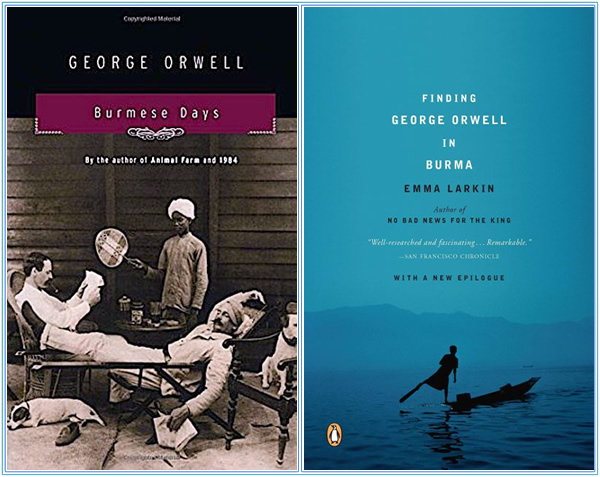
George Orwell. The very name is associated in the English lexicon with critiques of despotic totalitarian rule. The author’s 1940s writings on tyranny and the individual were so lucid and true, one wonders how he penned such potent prose. Two reasons are usually given– 1) the strict regimen of the British boarding schools he attended and 2) his experiences during the Spanish Civil War, where he saw facts twisted into communist propaganda and where he was wanted by the Russian police force. Emma Larkin, in Searching for George Orwell in Burma, suggests a third reason– Orwell’s “work as an imperial policeman contributed to his ability to write about oppression.” Larkin’s idea is that Orwell’s years in Burma provided him insight into how authoritarian institutions insidiously undermine individual identities and personal relationships. She makes an intriguing case, presenting first and second-hand accounts of Orwell’s life in Burma as well as some discoveries of her own and juxtaposing them with his writing.
To fully appreciate Larkin’s idea, one first should get one’s head around the fact that before becoming a writer, before empathizing with the down-and-out in Paris and London or authoring his famously chilling insights into the psychology of authoritarian governments, Orwell was in fact, for five years, a British colonial cop with a toothbrush mustache who beat his Burmese coolies “in moments of rage…. Orientals can be very provoking” as he put it. But Orwell also wrote about coming to see British imperialism as an “evil despotism” and about the part he played in it. “For five years I had been part of an oppressive system, and it had left me with a bad conscience.”
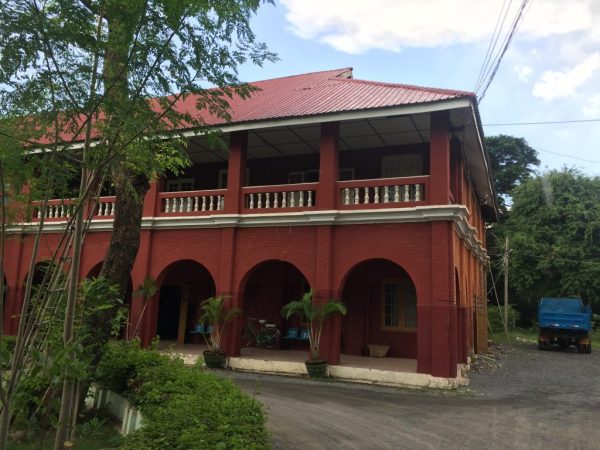
Following Orwell’s Trail
Larkin visited the cities and regions where Orwell worked. In Mandalay, where he received his training, he lived in the Police Officers’ Mess, a large red brick building that is still standing just a few blocks off the southeast corner of Mandalay Palace, now used to house visiting high-ranking police officials. I walked onto the grounds, and tried to go up the stairs to take a look at the rooms where Orwell had quartered. A smiling guard who spoke no English held up his hand and shook his head. I smiled back and showed him the cover of Larkin’s book with George Orwell’s name on the front, to which he responded by tapping out the positions of shoulder insignia on either side of his neck. His communicative gestures were more effective than mine. I walked out of the compound, but not before taking a quick photo of the building. On the second floor near corner is the room where Larkin writes that a police officer in training killed himself, perhaps influencing events in Orwell’s first novel, Burmese Days. (Belief in ghosts is common in Burma, and the room’s whited-out windows seemed to suggest it might be in permanent disuse.)
Orwell’s first posting was for one year in the Delta. Larkin quotes one Burmese writer’s opinion on the source of Orwell’s pessimism: “It was the Delta that ruined him.” This seems plausible. The region was, and still is, very poor. There were only one or two other British police officers for company, the endless landscape of muddy rivers, green fields and blue sky was intensely monotonous, and Orwell began his posting during a time of record levels of violent crime—perhaps a potent brew for pessimistic reflection.
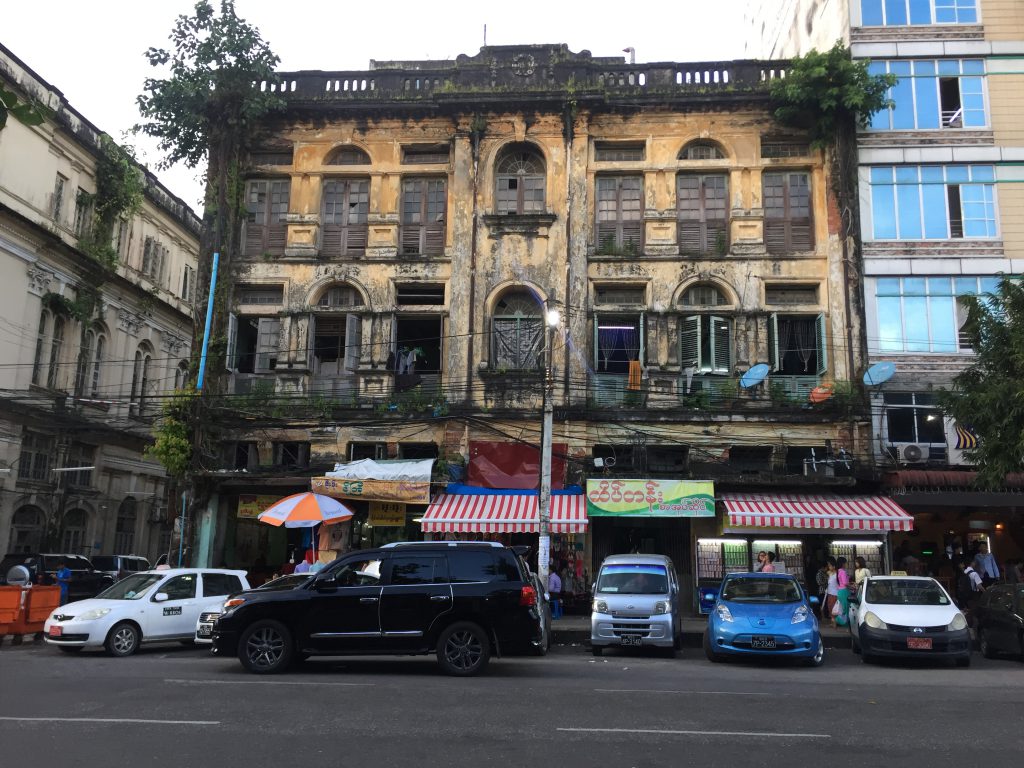
Myaungmya may have changed somewhat since then, but not the landscape, and on the bus from Yangon, the poverty of the region is still on full display. Bamboo houses stand on stilts above marshland, often accessible by only a single-beam walk-way. A ferry is necessary to access Myaungmya because in 2018, a 21-year-old suspension bridge collapsed.
Larkin also visited Yangon, where Orwell was posted to a couple of nearby locations, one of which was Insein Township, where Insein Prison is located. It is the second largest prison in Burma, and during Orwell’s time housed the country’s most dangerous criminals. It could have been the source for Orwell’s descriptions of depressing prison scenes, both in his fiction and non-fiction. More recently, it held tens of thousands of political prisoners during the decades of Burma’s military rule. While one cannot tour the prison, it is worth visiting the small office and museum of the Assistance Association of Political Prisoners (AAPP) in Yangon. The museum displays a small-scale model of the prison as well as a full-scale replica of a prison cell. Museum guides are themselves former political prisoners. Today the number of political prisoners is no more than a couple dozen or so, but the number of Burmese who are former political prisoners probably reaches into the hundreds of thousands. The AAPP also assists political prisoners with food, medical treatment, visits from loved ones, and documents conditions inside the prison.
Orwell also spent time in Moulmein, now called Mawlamyine, a city with a relaxed charm at the confluence of the Thalwin, Gyaing, and Attayan Rivers. He even had family there. Following Larkin’s book, I visited an Anglican church where a priest produced the gravestone of Eliza Emma Limouzin, the first wife of Frank Limouzin, Orwell’s grandfather. There is a Limouzin Street in the city. I did not attempt to locate the birth records of some other family members that Larkin mentions in her book, which indicated that Orwell may have had mixed Anglo-Burmese cousins.
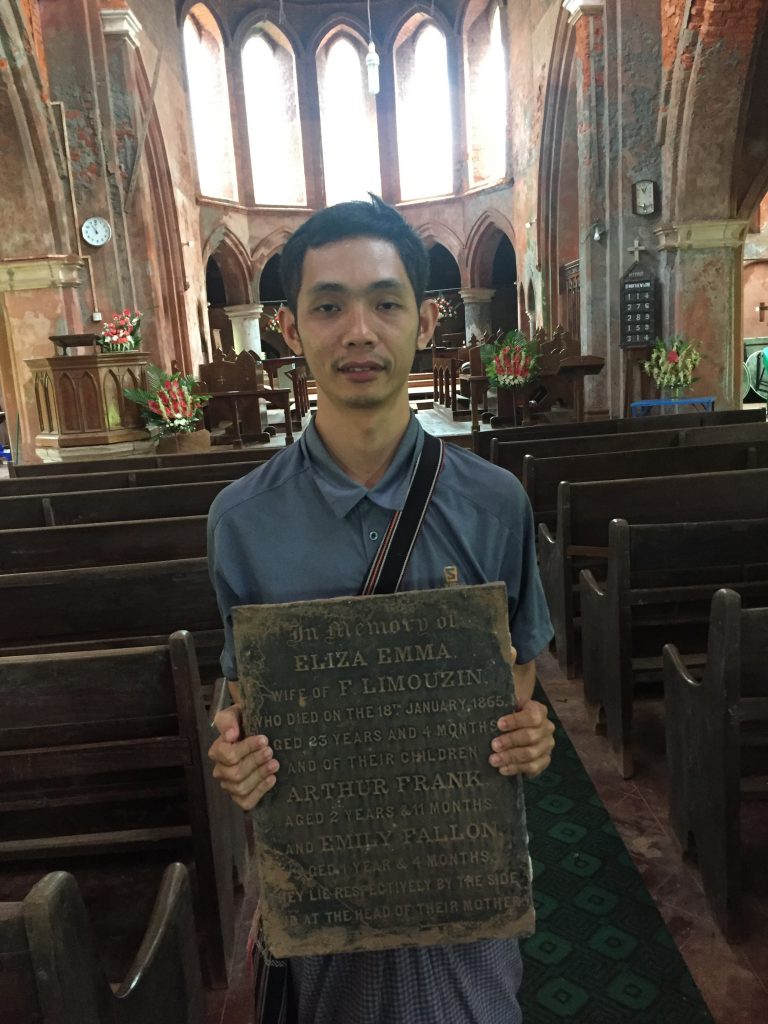
Moulmein is the setting for Orwell’s famous essay, Shooting an Elephant. It is also where Kipling set his famous poem Mandalay. On the steps of the main Moulmein Pagoda, called Kyaik Than Lan Pagoda, which sits high on a mountain ridge, one gets the same beautiful view of the city and sunset that Kipling must have had when he wrote:
By the old Moulmein Pagoda, lookin’ lazy at the sea,
There’s a Burma girl a-settin’, and I know she thinks o’ me…
When the mist was on the rice-fields an’ the sun was droppin’ slow,
She’d git ‘er little banjo an’ she’d sing “Kulla-lo-lo!…
…For the temple-bells are callin’, an’ it’s there that I would be —
By the old Moulmein Pagoda, looking lazy at the sea.

Burmese Days
Orwell was also posted in Katha, which became the setting for his book Burmese Days, about a young British teak merchant, Flory, who is disillusioned with the bigoted British colonial system and his own unjust participation in it.
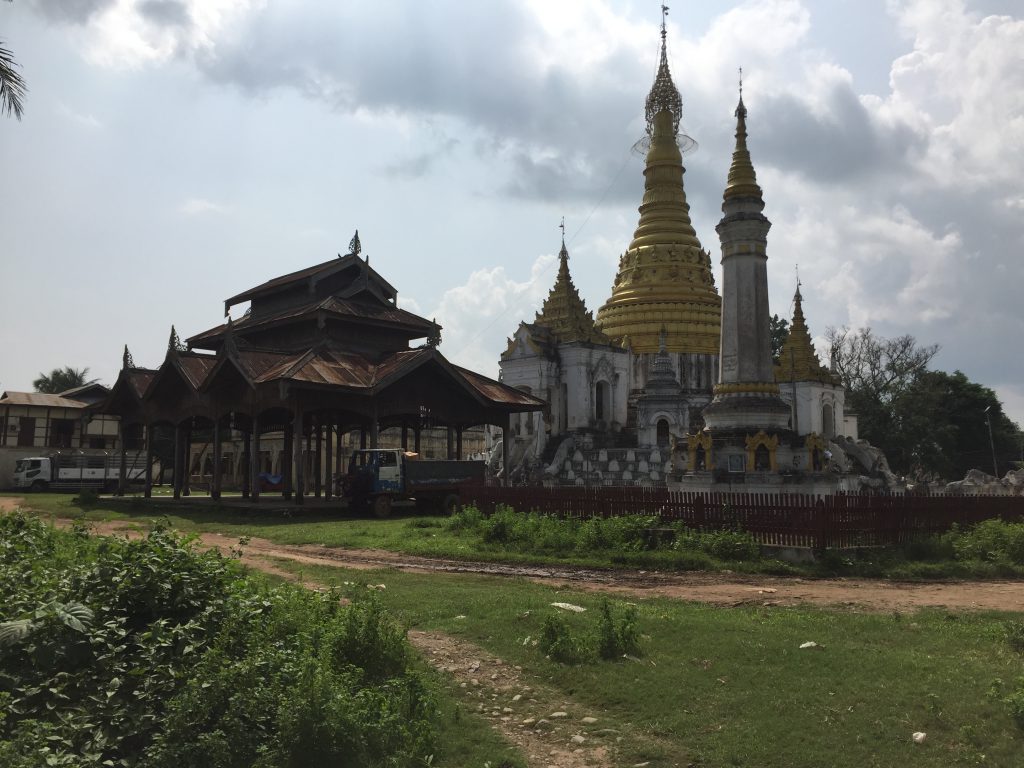
Larkin quotes Flory’s ruminations on expatriate life in the British Raj: “It is a world in which every word and every thought is censored … even friendship can hardly exist when every white man is a cog in the wheels of despotism. Free speech is unthinkable. All other kinds of freedom are permitted. You are free to be a drunkard, an idler, a coward, a backbiter, a fornicator; but you are not free to think for yourself.” Flory looks to give meaning to his life by courting a young but fairly shallow Englishwoman. Meanwhile, U Po Kyin, a corrupt, status-obsessed Burmese bureaucrat, attempts various behind-the-scene manipulations to attain a coveted membership at the exclusively British Kyauktada Club. The two mens’ plans ultimately collide and end in tragedy.
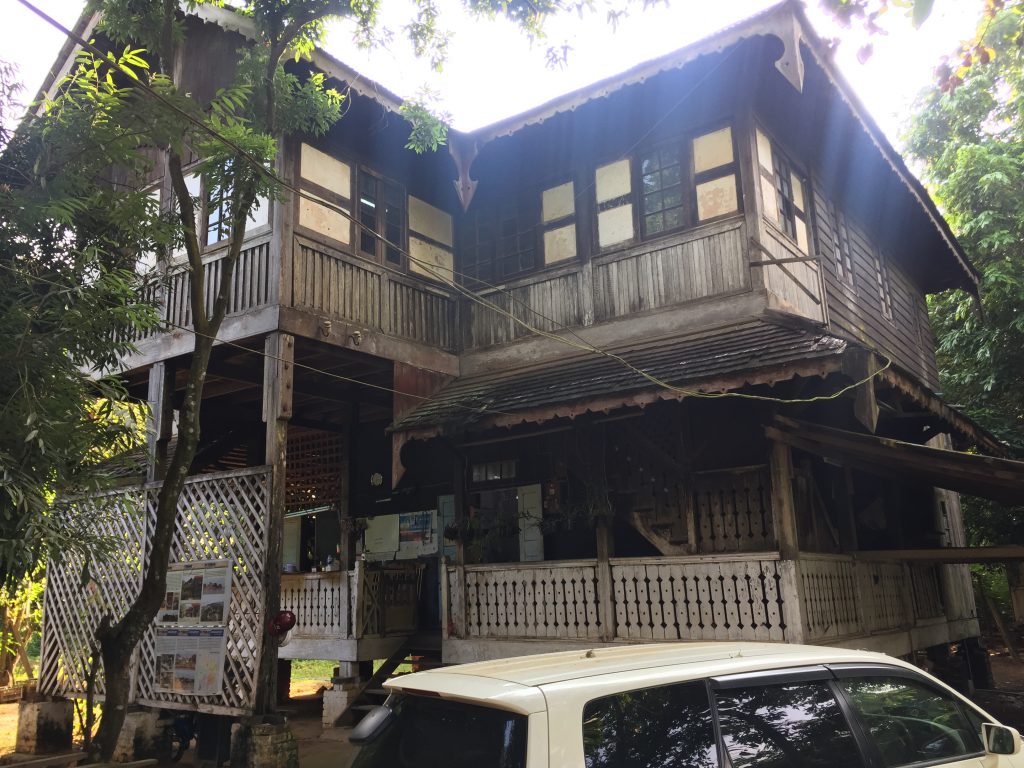
Most of the scenes in Burmese Days take place in close proximity to each other at the British Club: U Po Kyin’s house, the Pagoda, the church, McGregor’s house, the Lakersteen’s house, all of which are still standing. My hotel offered free transportation and a guide to all these locations, which are are laid out in a map sketched by Orwell that accompanies the modern edition of Burmese Days. As well, the house where Orwell himself lived is open for free tours. (A police officer lives on the first floor.) The bazar is now an empty lot where the ferry and the fast boat from Mandalay dock on the Irrawaddy River. But the atmosphere of the bazar might have been similar to the one on Butar Yone Street, where all sorts of food and other items are sold, and recorded Burmese music is played.
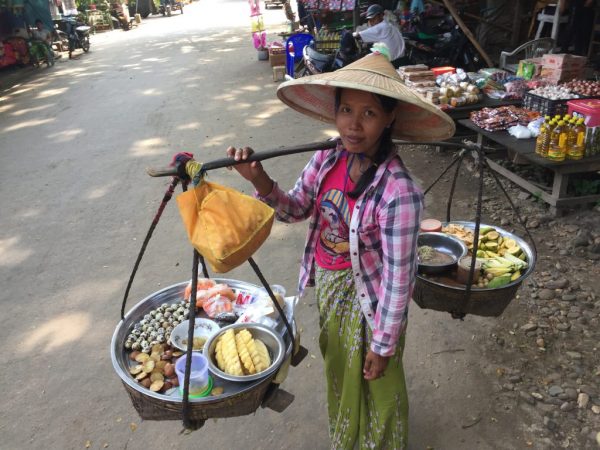
And walking around the market area, you will hear school children reciting their lessons.
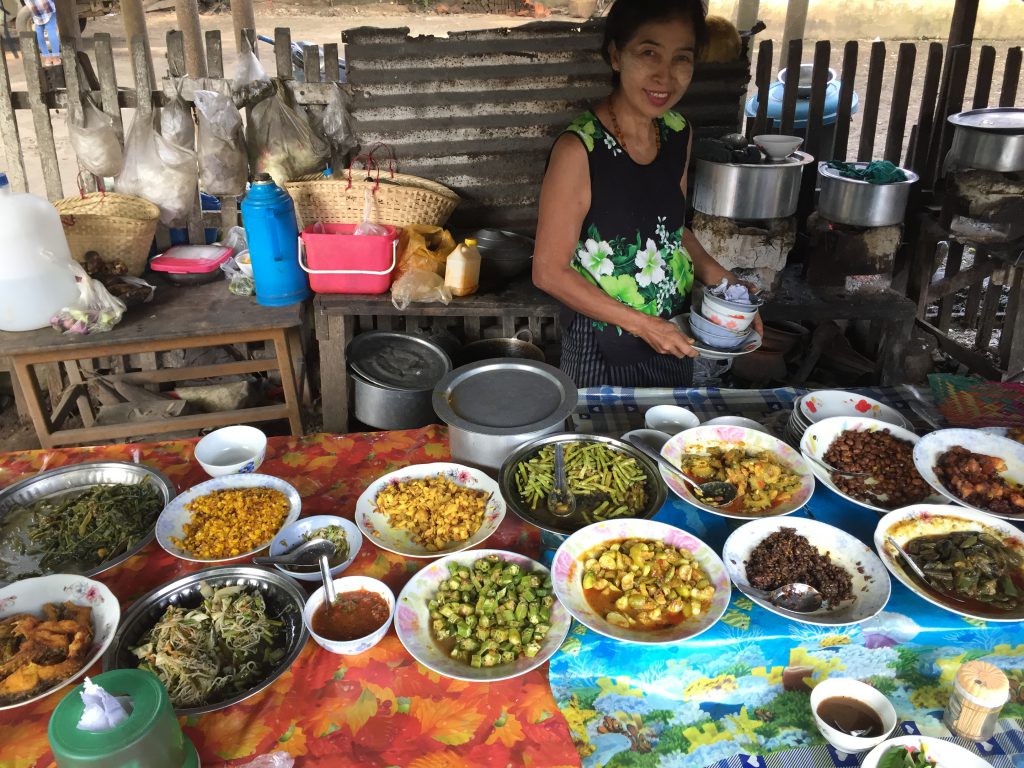
Traveling there
Practical travel considerations: There is a bus to and from Mandalay/Katha, which I did not take. The overnight ferry from Mandalay to Katha takes about 36 hours, and foreigners must pay $45 US dollars (not local currency). The sales office is not always open during normal office hours, but if no one is there, someone will come at some point later in the day after the dock workers arrange a meeting time for you. (Before noon might be the best time.) There are points where the ferry docks to load cargo for an hour or two, which offers a short opportunity to see a Burmese village. There is also a fast boat, which takes about twelve hours between Katha and Mandalay. It is very basic, with no lifejackets that I saw. To access the bathrooms, be prepared to walk about 10 meters to the stern along 16-inch gunwales with handrails for support.
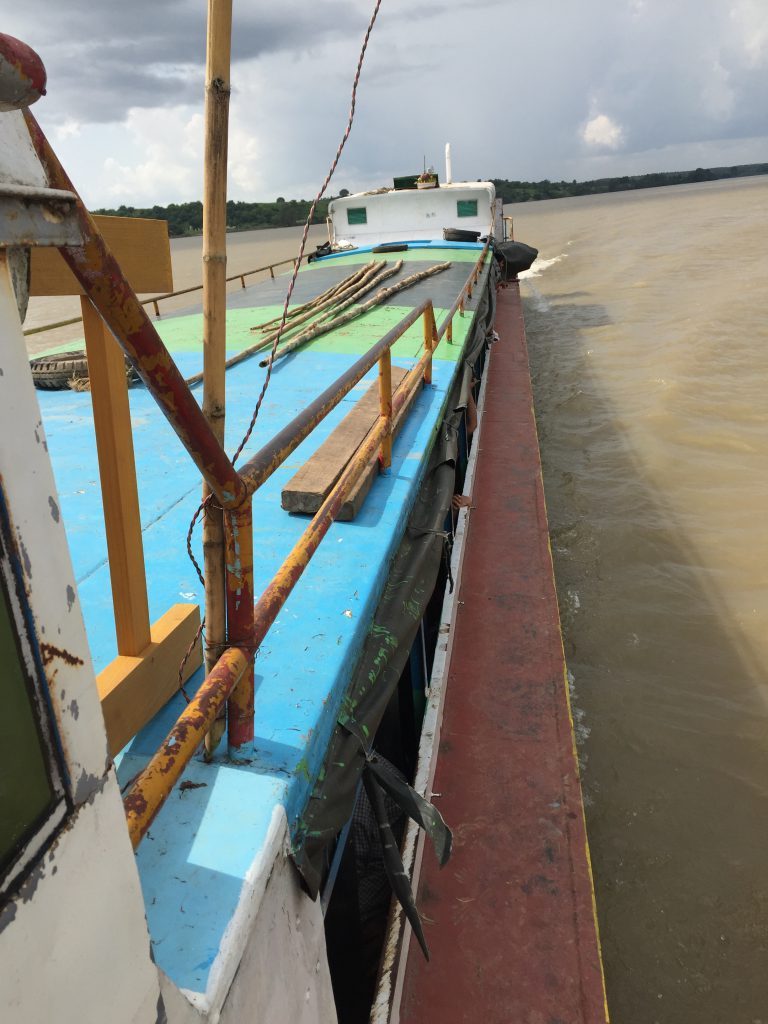
James Weitz—August 2018
About the writer:
Jim Weitz is author of the novel Gonzo Global Inc., a satire of globalization in which Mexican tap water is exported to the United States and sold as a laxative. He has lived in Asia and Latin America for most of the last 15 years. During that time, he has worked as a technical editor and taught at universities in Latin America, China and Taiwan. Previously, he worked on anti-corruption issues at the Organization of American States, and earlier at the World Bank. His stories have appeared in the journals Red Savina Review and Pennyshorts. Weitz has an MA in Applied Linguistics with a focus on cross-cultural communication from Nottingham University, and a Juris Doctor from the University of Minnesota. He is also a fiction editor at www.ojalart.com.
Images of Burma: Courtesy Jim Weitz


 Not to mention a great, very readable introduction to the legal problems of many of today’s international free trade agreements. And so I’m offering a free download here of the first 8000 words or so. And if you agree that it’s a worthwhile read, you can find it on Amazon where it’s looking for a good home. Thanks for taking a look. And if you would also like a free 10,000-word novelette that is indeed set in Asia during my years living in Shanghai, it’s available in exchange for a valid email address. I hope my stories leave you happy and laughing!
Not to mention a great, very readable introduction to the legal problems of many of today’s international free trade agreements. And so I’m offering a free download here of the first 8000 words or so. And if you agree that it’s a worthwhile read, you can find it on Amazon where it’s looking for a good home. Thanks for taking a look. And if you would also like a free 10,000-word novelette that is indeed set in Asia during my years living in Shanghai, it’s available in exchange for a valid email address. I hope my stories leave you happy and laughing!
